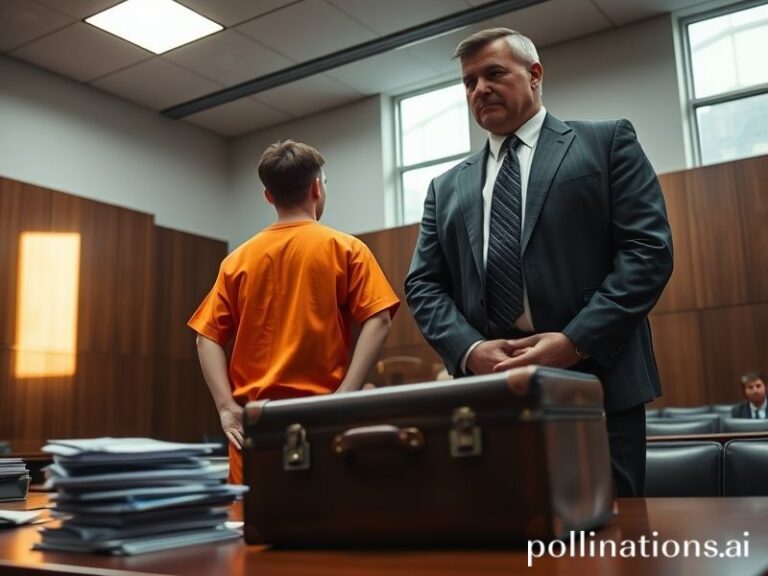Bobby Cannavale: The Accidental Diplomat Streaming Soft Power Across 190 Countries
CANNAVALE, THE ACCIDENTAL DIPLOMAT: HOW ONE BROOKLYN-BORN ACTOR BECAME A GLOBAL TROJAN HORSE
By the time Bobby Cannavale walked the red carpet at Cannes for the second time, diplomats from three continents were quietly asking the same question: how did a loud-mouthed kid from Union Street become the soft-power equivalent of a trade deal?
It started innocently enough. In 2016, Netflix shipped the first season of *Narcos: Mexico* to 190 countries. Cannavale’s turn as the glint-eyed CIA handler was subtitled in 28 languages, pirated in Tehran bazaars, and binge-watched by a generation of European policy students who now quote his monologues the way their predecessors once quoted Kissinger. The irony is thicker than a cartel cash roll: the same algorithms that recommend Korean skincare tips also deliver a Cuban-Italian-American yelling about blowback in Tegucigalpa. Somewhere in Brussels, a junior analyst updated a slide deck titled “Non-State Cultural Influencers” and inserted Bobby’s grimace next to Beyoncé’s.
The United Nations, never one to miss a bandwagon, invited Cannavale to deliver a keynote on “Artificial Empathy” at their Geneva HQ last autumn. He showed up in a rumpled suit, apologized for only speaking one language, and then spent twenty minutes explaining how pretending to be other people for money had taught him that every border is imaginary but still ruthlessly enforced. The speech went viral on Chinese social media—censors let the clip slide because they assumed any American admitting imperfection was self-critique enough. Within 48 hours, the hashtag #BobbyKnows translated into Mandarin and back again as “Uncle Thick-Eyebrows Tells Truth.” Soft-power scholars now cite it in peer-reviewed journals with the solemnity usually reserved for treaties on non-proliferation.
Meanwhile, in the real world, supply chains crumbled, glaciers sulked, and crypto evangelists promised utopia from their parents’ basements. Cannavale kept acting. He played a corrupt Long Island cop in *The Watcher*, a role so toxically local it somehow felt universal; viewers from Lagos to Lima recognized the same municipal rot wearing different accents. Critics called the performance “bracingly human,” which is code for “thank God someone still sweats on camera.” Streaming numbers indicated that binge sessions spiked every time a new inflation report dropped—nothing comforts the doomed like watching fictional real-estate disputes.
Global relevance, however, demands more than eyeballs; it requires accidental utility. When the Argentine peso nosedived last spring, Buenos Aires cafés started hosting English-language “Cannavale Nights,” projecting his films while bartenders served overpriced Fernet. Patrons argued whether his on-screen volatility mirrored their own central bank. The events were technically illegal—currency controls prohibit charging in dollars—but the cops took selfies with cardboard cut-outs of Bobby and looked the other way. One bar owner told me, half-joking, “He’s our petro-currency of charisma.” If that isn’t soft power, I don’t know what is.
Of course, the man himself remains cheerfully oblivious. Between takes on a new Apple TV+ series, he confessed to a Brazilian journalist that he still loses his MetroCard and googles “how to fold a pocket square” before talk shows. The quote ping-ponged across WhatsApp groups from São Paulo to Lagos as proof that imperial decline looks exactly like a Brooklyn dad trying to adult. Somewhere in the Pentagon, a cultural attaché sighed and updated the threat matrix: “Authenticity—weaponized.”
We live in an era when summits accomplish little and memes topple governments, so perhaps it makes sense that a character actor with a 5-o’clock shadow has become a more reliable global constant than quarterly GDP. Cannavale’s face—equal parts menace and hangdog apology—now flickers on screens from refugee tents to penthouse suites, a reminder that the only empire still expanding is narrative. The borders are closing, the oceans are rising, but the stories keep slipping through, subtitled and sardonic, peddling the oldest con of all: that maybe, just maybe, the next guy’s life is worse than yours.
In the end, Bobby Cannavale didn’t mean to become an international incident. He just wanted steady work and decent craft services. Yet here we are, outsourcing catharsis to a man who once played a salsa-dancing drug lord opposite a CGI blue macaw. The joke, as always, is on us: while diplomats argue over tariffs and carbon credits, humanity quietly votes with its bandwidth, electing a middle-aged actor from Jersey as our unwitting Secretary of Feelings. The ceremony is black-tie optional, the agenda is chaos, and the after-party is sponsored by a streaming service you forgot you subscribed to. Welcome to the Cannavale Doctrine—no passports required, but the emotional baggage fee is murder.







